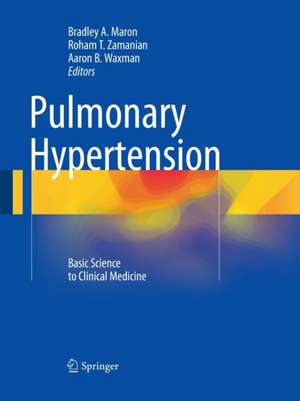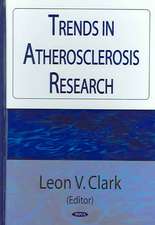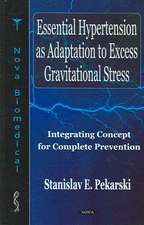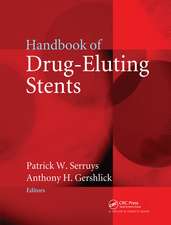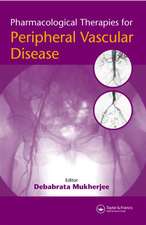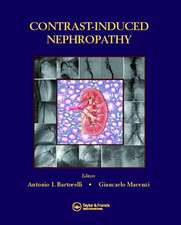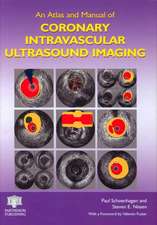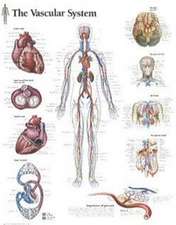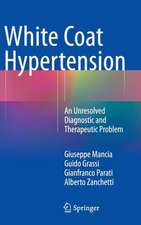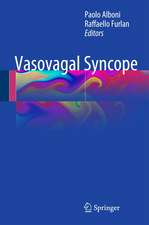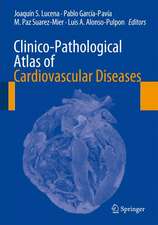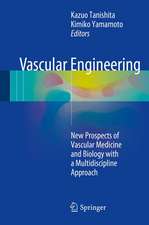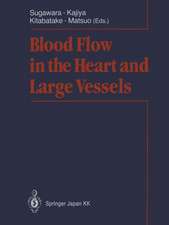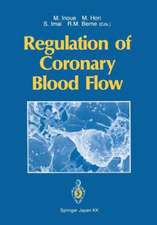Pulmonary Hypertension: Basic Science to Clinical Medicine
Editat de Bradley A. Maron, Roham T. Zamanian, Aaron B. Waxmanen Limba Engleză Paperback – 23 aug 2016
| Toate formatele și edițiile | Preț | Express |
|---|---|---|
| Paperback (1) | 860.19 lei 6-8 săpt. | |
| Springer International Publishing – 23 aug 2016 | 860.19 lei 6-8 săpt. | |
| Hardback (1) | 1094.01 lei 38-44 zile | |
| Springer International Publishing – 10 noi 2015 | 1094.01 lei 38-44 zile |
Preț: 860.19 lei
Preț vechi: 905.47 lei
-5% Nou
Puncte Express: 1290
Preț estimativ în valută:
164.59€ • 171.86$ • 135.92£
164.59€ • 171.86$ • 135.92£
Carte tipărită la comandă
Livrare economică 15-29 aprilie
Preluare comenzi: 021 569.72.76
Specificații
ISBN-13: 9783319347851
ISBN-10: 3319347853
Pagini: 371
Ilustrații: XVI, 371 p.
Dimensiuni: 210 x 279 x 25 mm
Greutate: 0.87 kg
Ediția:Softcover reprint of the original 1st ed. 2016
Editura: Springer International Publishing
Colecția Springer
Locul publicării:Cham, Switzerland
ISBN-10: 3319347853
Pagini: 371
Ilustrații: XVI, 371 p.
Dimensiuni: 210 x 279 x 25 mm
Greutate: 0.87 kg
Ediția:Softcover reprint of the original 1st ed. 2016
Editura: Springer International Publishing
Colecția Springer
Locul publicării:Cham, Switzerland
Cuprins
Historical Perspective on the Classification and Nomenclature of Pulmonary Hypertension.- The Defining Characteristics of Pulmonary Arterial Hypertension.- Pulmonary Hypertension in Patients Without Pulmonary Arterial Hypertension.- Epidemiology of Pulmonary Hypertension: From Quaternary Referral Centre to the Community.- The Effects of Chronic Hypoxia on Inflammation and Pulmonary Vascular Function.- Genetics of Pulmonary Vascular Disease.- Novel Mechanisms of Disease: Network Biology and MicroRNA Signaling in Pulmonary Hypertension.- Pulmonary Hypertension as a Metabolic Disease.- Renin-Angiotensin-Aldosterone and other Neurohumoral Factors in the Pathogenesis of Pulmonary Hypertension.- Animal Models of Pulmonary Hypertension.- The Cardiopulmonary Hemodynamic Evaluation of Pulmonary Hypertension.- Advanced Imaging in Pulmonary Hypertension.- Assessing Disease State in the Pulmonary Vasculature in Clinical Practice and Research.- Biomarkers and other Methods for Assessing Patient Progress.- Pulmonary Circulatory - Right Ventricular Uncoupling: New Insights into Pulmonary Hypertension Pathophysiology.- Contemporary Pharmacotherapies Involving Nitric Oxide, Prostacyclin, and Endothelin Receptor Signaling Pathways.- Determining the Optimal Approach to Initiating Oral, Inhaled, and Intravenous Therapies in Clinical Practice: Sequential Goal-Directed Therapy is Best.- Counterpoint: Determining the optimal approach to initiating oral, inhaled, and intravenous therapies in clinical practice: Maximal upfront therapy is best.- Surgery, Devices, Transplantation and Other Interventional Options for the Treatment of Advanced Pulmonary Hypertension.- Patient Registries in Pulmonary Arterial Hypertension: the Role of Survival Equations and Risk Calculators.- Support Care for the Pulmonary Hypertension Patient.- Special Considerations for the Pulmonary Hypertension Patient.- The Future of Pulmonary Hypertension.
Recenzii
“This is a comprehensive book on the important clinical topic of pulmonary hypertension, and one of the most up to date on this emerging field of study. … The intended audience is specialists in the field of cardiology and pulmonology. … This book is useful for both clinicians and those interested in basic science and translational research.” (Shubhum Misra, Doody's Book Reviews, February, 2016)
Notă biografică
Bradley A. Maron, M.D. is an Assistant Professor of Medicine at Harvard Medical School (HMS), Associate Physician in the Division of Cardiovascular Medicine at Brigham and Women’s Hospital, and Co-director of the Pulmonary Vascular Disease Center at the Boston VA Healthcare System. His research focuses on the basic mechanisms underpinning adverse pulmonary vascular remodeling. Dr. Maron’s research is funded by the NIH, among other prestigious foundations. He is also an Eleanor and Miles Shore Scholar in Medicine and HMS Excellence in Teaching award recipient.
Roham T. Zamanian, M.D. is an Assistant Professor of Medicine and Director of the Adult Pulmonary Hypertension Program at Stanford University School of Medicine. Dr. Zamanian completed medical school and Internal Medicine training at the University of California, Irvine Medical Center and fellowship in Pulmonary and Critical Care Medicine at Stanford University. Dr. Zamanian was also an eBay Pulmonary Vascular Disease super-fellow at the Vera Moulton Wall Center (VMWC) for Pulmonary Vascular Diseases at Stanford University. Besides an active clinical career, Dr. Zamanian is a translational scientist focusing on the discovery of novel biochemical and clinical risk factors for pulmonary vascular disease. Dr. Zamanian’s research is funded by the NIH and VMWC. Aaron Waxman, M.D., Ph.D., is the Executive Director of the Center for Pulmonary Heart Diseases at the Brigham and Women’s Hospital (BWH) Heart and Vascular and Lung Centers. Dr. Waxman directs the Pulmonary Vascular Disease Program at BWH. His interests focus on integrating clinical and basic investigations to understand further pulmonary vascular disease and right heart failure. Dr. Waxman directs a robust NIH-funded clinical and basic research program, posts leadership roles in several international organizations, and collaborates actively with clinical experts and investigators around the world.
Roham T. Zamanian, M.D. is an Assistant Professor of Medicine and Director of the Adult Pulmonary Hypertension Program at Stanford University School of Medicine. Dr. Zamanian completed medical school and Internal Medicine training at the University of California, Irvine Medical Center and fellowship in Pulmonary and Critical Care Medicine at Stanford University. Dr. Zamanian was also an eBay Pulmonary Vascular Disease super-fellow at the Vera Moulton Wall Center (VMWC) for Pulmonary Vascular Diseases at Stanford University. Besides an active clinical career, Dr. Zamanian is a translational scientist focusing on the discovery of novel biochemical and clinical risk factors for pulmonary vascular disease. Dr. Zamanian’s research is funded by the NIH and VMWC. Aaron Waxman, M.D., Ph.D., is the Executive Director of the Center for Pulmonary Heart Diseases at the Brigham and Women’s Hospital (BWH) Heart and Vascular and Lung Centers. Dr. Waxman directs the Pulmonary Vascular Disease Program at BWH. His interests focus on integrating clinical and basic investigations to understand further pulmonary vascular disease and right heart failure. Dr. Waxman directs a robust NIH-funded clinical and basic research program, posts leadership roles in several international organizations, and collaborates actively with clinical experts and investigators around the world.
Textul de pe ultima copertă
This definitive textbook details the rapid advances in epidemiology, pathobiology and therapeutics in the field of pulmonary hypertension. Despite recent progress, under-awareness persists within the practicing pulmonary, cardiovascular, and general internal medicine communities. This is due, in part, to the complex array of molecular mechanisms implicated in the pathobiology of PH, as well as cutting-edge discoveries from translational scientific works that provide a new framework by which to understand pulmonary vascular-right ventricular coupling. This book bridges this knowledge gap through the synthesis of a contemporary text that emphasizes basic science, translational and clinical principles, and treatment strategies for understanding pulmonary hypertension.
Pulmonary Hypertension: Basic Science to Clinical Medicine is the essential reference for any physician or scientist with an interest in pulmonary hypertension. The Editors and their hugely knowledgeable listof contributors have provided a contemporary, comprehensive overview of the field in all of its complexity that will be vital for all levels of clinician, researcher and trainee in respiratory medicine, cardiology, critical care and all disciplines involved in the management of patients with pulmonary hypertension.
Pulmonary Hypertension: Basic Science to Clinical Medicine is the essential reference for any physician or scientist with an interest in pulmonary hypertension. The Editors and their hugely knowledgeable listof contributors have provided a contemporary, comprehensive overview of the field in all of its complexity that will be vital for all levels of clinician, researcher and trainee in respiratory medicine, cardiology, critical care and all disciplines involved in the management of patients with pulmonary hypertension.
Caracteristici
Emphasizes basic mechanisms of disease, translational and clinical principles of pulmonary hypertension and right ventricular dysfunction Discusses controversies in PH disease management to provide the readership with balanced opinions on hot topics in the field Serves as the state of the art text in pulmonary vascular disease by providing a comprehensive review of each pertinent and cutting-edge principle material to scientific to clinical domains within the field?
